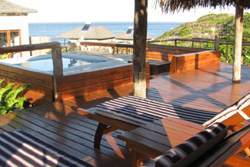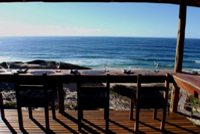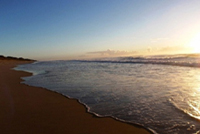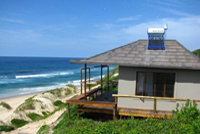 Accommodation:
Villa Accommodation:
Villa
Blue Footprints Eco-Lodge invites you to join us in barefoot luxury
at our exclusive sanctuary. The five exclusive Blue Footprints Villas
have been designed to maximize the spectacular views of the ocean,
and to give the privacy and solitude each guest deserves. They offer
a unique mix of rustic and luxury elements, nestled in the natural
dune, providing an underlying sense of relaxation and rejuvenation.
All rooms have open plan, en-suite bathrooms with basins, toilet
and frameless inside shower with an ocean view. Each villa has its
own deck, outside shower and day bed, each with 180 degree, unobstructed
ocean views. As it takes a maximum of 10 guests, they offer an intimate
and tranquil base from which to explore this unique and diverse
corner of Africa. Only the sound of the Indian Ocean and the call
of the wild can disturb the peace.
Pricing
Standard Villa Rate R1150 per person per night
Peak Villa Rate R1350 per person per night
Visa Requirements
South African passport holders do not require a visa to enter Mozambique.
International travelers require a visa for Mozambique which is purchased
on arrival at the first port of entry into the country and paid
for in US$ cash and could be subject to change. Mozambique currently
does not except any US$ dated before 2007. Alternatively, in some
countries, a visa can be obtained prior to entry from the Mozambique
Embassy.
Ensure that your passport is valid for at least 6 months and has
two empty pages (front and back pages both blank) clear for stamps.
Driving
Inhambane is situated 460 km north of Maputo. Please note that the
last 5 km is only accessible with 4x4 vehicles.
Flying
LAM (Mozambique’s National Airline) offer flights to Inhambane
from both Johannesburg International Airport and Maputo. There are
direct LAM flights available from Johannesburg Airport (O.R Tambo)
in South Africa, as well as from Maputo to Inhambane, Mozambique.
The flight is approximately 1h45. Please note that there is a strict
20kg luggage allowance on LAM flights. There is a charge on any
excess luggage.
Malaria
The Inhambane area located in central Mozambique is considered to
lie within the malaria belt. It is advisable that you take some
form of prophylactic drugs. Always get the latest advice from your
doctor at least a month before travel. Whilst here, cover up and
use a mosquito repellent between sunrise and sunset, and always
use the mosquito nets provided.
Divers need to be aware that certain anti-malarial drugs or malaria
prophylactic are contraindicated with scuba diving. Please ensure
that you find out from your doctor or DAN (Divers Alert Network),
which option would best suit your needs.
Currency
The Mozambique currency is the Metical. Most places in Mozambique,
including Blue Footprints accept Rands, Euros, Dollars and British
Pounds, but it is best to check in advance which currencies are
acceptable. Blue Footprints also accepts payment by VISA and Mastercard.
Climate
Mozambique has a typically tropical climate with hot and humid conditions
along the coastal lowlands during the summer months, especially
from December to March, and pleasantly warm during the winter days
with cool evenings. Rainfall, mostly in the way of tropical thundershowers,
tends to fall between November and March, however in the last few
years we have experienced sporadic rainfall in May, June and July.
Average day time temperatures range from 24oC to 34oC+. The warm
Mozambique current flows southwards along the coast and is an important
influence on the climate of the country.
The coast of northern Mozambique is occasionally affected by tropical
cyclones in the Indian Ocean. These tend to start with tropical
depressions east of Madagascar. From time to time they move south
or north, entering the Mozambican channel, where they can make landfall
on the Mozambican coastline, but the majority pass east of Madagascar
and hardly affect Mozambique. These cyclones bring heavy rain and
strong winds and can cause large swells.
Restaurant and Bar
Inside is a laid back atmosphere where our guests can relax, recharge
and soak in the magnificent views, while enjoying the unique flavors
of food that only Mozambique has to offer. Our menu selection is
carefully planned to meet the needs of all our guests and to introduce
them to the exotic flavors of the region. Great care is given to
creating meals that are a reflection of our commitment and hopefully
leave a lasting impression on every guest, creating moments that
are unforgettable.
Dishes range from authentic grilled prawns marinated in lime and
chilli to delectable homemade tri-coloured chocolate mousse.
All our produce is carefully selected and use only the best of
local suppliers and fisherman with the freshest produce. No endangered
or vulnerable species from the ocean are used, thereby confirming
further their commitment to conservation.
All meals are accompanied by only the finest selections of wines
and liqueurs to further the gastronomic experience in our restaurant.
A wide variety of freshly made exotic cocktails are available to
all guests whilst they relax next to our pool enjoying the ocean
breeze.
Credit Card Facilities
The Mozambique currency is the Metical. Most places in Mozambique,
including Blue Footprints accept Rands, Euros, Dollars and British
Pounds. Blue Footprints also accepts payment by VISA and MasterCard
for extras but does not accept traveler’s cheques.
Electricity
As an Eco-Lodge in the true sense of the word, all electricity at
the lodge is supplied using solar energy. We encourage guests to
assist in conserving energy in the following ways:
Avoid using electric appliances that draw a lot of power.
Turn off lights when leaving your room and during the day.
Unplug any electrical appliances not being used.
Internet access and Telephone
There is strong cellular phone reception at the lodge. There are
no landlines in the lodge. Internet access is available through
“internet sticks”.
Rates Include
Breakfast and Dinner
Accommodation
Tea and Coffee
Rates Exclude
All Beverages (All beer, soft drinks, mineral water, local and imported
spirits, local and imported wines, champagne, cognac, cigars and
cigarettes)
All Activities and Extras
Flights and related taxes and fees
Visa
Airport Tax
Telephone calls
Items of a personal nature
Travel insurance
Gratuities
Transfer to and from Inhambane Airport
Please note that LAM airlines has a strict 20kg luggage limit.
History
The earliest known inhabitants of Mozambique were the San. This
nomadic tribe survived largely through hunting and gathering. Between
the first and fifth centuries, Bantu-speaking tribes migrated through
the Zambezi valley and through to the coastal plains.
Portuguese explorer, Vasco da Gama is believed to have reached the
Mozambican coastline in 1498. By this time, there was already evidence
of Arab and Swahili trading settlements along the coastline, which
had been in existence for several centuries prior to Vasco Da Gama’s
landing.
In 1505, Mozambique became a Portuguese colony and during the 16th
and 17th centuries, trading posts and forts were set up along the
coastline with limited ventures into the interior until the gold
rush in the Transvaal. Throughout the 17th and 18th centuries, Mozambique
became a major slave trading centre, supplying Arabia and the Ottomans,
until Portugal outlawed slave trade in 1842, although clandestine
trade continued for decades after this.
Toward the end of the 19th centuary, Portugal leased large tracts
of territory to trading companies who used Mozambican labour to
further their interests and build infrastructure.
In 1891, the contention over the Mozambique’s western and
southern border between Portugal and Britain was settled by French
Prime Minister MacMahon, thus defining the present day borders between
South Africa and Mozambique.
In 1932 Portugal broke up the trading companies and imposed direct
colonial rule over Mozambique. During the 1950s and 1960s, the colonial
economy thrived, with thousands of Portuguese settlers being attracted
to Mozambique.
In 1962, activists opposed to Portuguese colonial rule who had previously
been exiled, formed the Mozambique Liberation Front, Frelimo, headed
by Eduardo Mondlane. In 1964, Frelimo forces began the war of independence
reverting largely to Guerilla tactics and taking control of large
areas of the north of Mozambique, with some military equipment and
training from the Soviet Union, China and Algeria.
In 1974, a military coup in Portugal lead to a new government which
supported autonomy for Portugal’s colonies. Frelimo moved
quickly and signed an agreement with the new Portuguese government
to take control of Mozambique. This began the start of the departure
of 250 000 Portuguese inhabitants from Mozambique, collapsing the
social and economic structure in the country. Portugal and Frelimo
signed the Lusaka Accord in 1974, establishing a transitional government,
with Mozambique gaining independence on the 25th June 1975, after
470 years of colonial rule. Frelimo ruled Mozambique under a single
party system with Samora Machel as Mozambique’s president.
Frelimo later adopted a Marxist-Leninist doctrine.
In 1976, the Mozambican Resistance Movement, RENAMO was formed,
backed by Rhodesia in an effort to stop the flow of weapons to ZANLA
guerillas who were based on the Mozambican border and fighting against
the Rhodesian government. With independence being gained in 1980
and Rhodesia becoming Zimbabwe, RENAMO was backed by forces in South
Africa in an attempt to counter opposition ANC guerillas basing
themselves in across the border in Mozambique. Thus began the bloody
and violent civil war in Mozambique. The protracted civil war ruined
the Frelimo’s economic administration. The Mozambican civil
war was particularly savage, with attacks on civilians and the drafting
of child soldiers. The country fell into economic ruin, there was
widespread famine, another mass exodus of Mozambicans from Portuguese
decent and Mozambican nationals fleeing their homeland. Some 1.7
million Mozambicans are thought to have fled Mozambique to neighboring
countries.
In October 1986, Mozambique’s president Samora Machel was
killed when his aircraft crashed near the South African border.
He was succeeded by Joaquim Alberto Chissano who continued expanding
Mozambique’s links with the West and pursuing internal reforms.
In 1989, Frelimo renounced their Marxist-Leninist doctrine. In 1990,
the end of the Cold War and the collapse of Apartheid in South Africa,
resulted in the support for the RENAMO forces drying up and the
first talks between RENAMO and Frelimo were held. Frelimo’s
draft constitution paved the way for a multiparty system and a new
constitution being adopted and democratic rights being guaranteed.
In 1992, the Rome General Peace Accord was signed in Rome between
President Chissano and Renamo leader Afonso Dhlakama. A UN peacekeeping
force oversaw the transition to democracy with elections being held
in October 1994 and Chissano being re-elected as President. In 1995,
Mozambique became a Commonwealth member and in 1999 Chissano is
re-elected in the presidential elections. In February 2000, Mozambique
experienced devastating flooding, displacing thousands of people
and causing massive damage. In 2005, after Chissano steps down after
18 years in power, Armando Guebuza is inaugurated as President.
Email for Reservations: book@go.mozbookings.com



|

